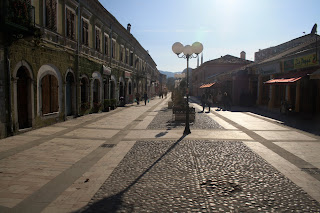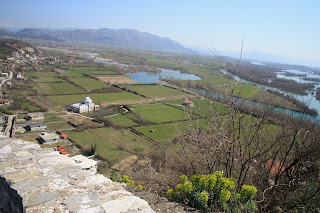 This street is pedestrian only. The facades date from the time the Venetians were in control of Shkodra -- 1396 - 1479. The Ottomans captured Shkodra then and it remained under Turkish control until the Balkan wars of 1912-1913. During the Second Balkan War of 1913, Montenegrans captured Shkodra and planned to make it part of "Great Serbia," a nationalistic idea evidently still held by many Serbs. Neither Italy or Austria wanted Serbia to have an outlet on the Adriatic, and The Powers forced Montenegro to give up Shkodra and Serbia to give up its Albanian conquest to the Adriatic.
This street is pedestrian only. The facades date from the time the Venetians were in control of Shkodra -- 1396 - 1479. The Ottomans captured Shkodra then and it remained under Turkish control until the Balkan wars of 1912-1913. During the Second Balkan War of 1913, Montenegrans captured Shkodra and planned to make it part of "Great Serbia," a nationalistic idea evidently still held by many Serbs. Neither Italy or Austria wanted Serbia to have an outlet on the Adriatic, and The Powers forced Montenegro to give up Shkodra and Serbia to give up its Albanian conquest to the Adriatic.
The Catholic cathedral on the main street. Shkodra and the mountain villages to the east are strongly Catholic, which is one reason Italy and Austria held so much influence here.

The oven at Tradita restaurant. Meat is cooked over the coals (lower left); wood is suspended over the coals by a metal basket, and as they catch and smolder and the coals drop into the coal bed so it is constantly replenished without being disturbed. The waiters (and the owner) wear traditional costumes.

The owner of the restaurant collects old artifacts and mountain clothing. On the outside wall he had these andirons hanging -- I thought they looked like Dachshund art pieces.






















